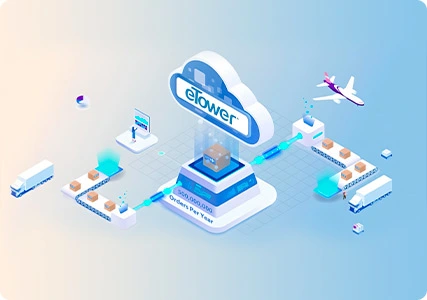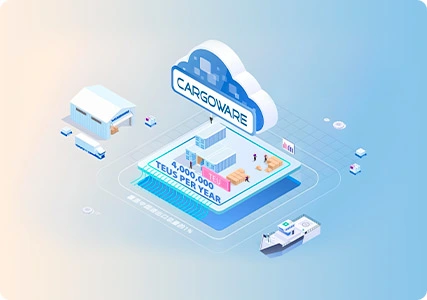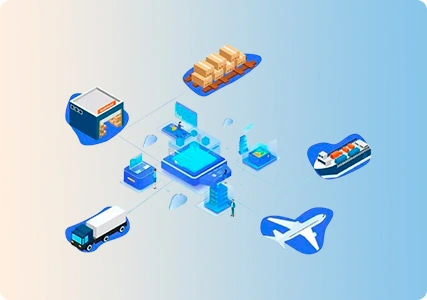
When it comes to selecting a cloud provider for your logistics business, security and compliance should be at the forefront of your priorities. A reputable cloud provider, such as Appinventiv, understands the significance of data security when integrating cloud technology into logistics operations. It is crucial for your chosen cloud provider to adhere to relevant regulations and standards, including GDPR, HIPAA, and ISO 27001. Failure to comply with these regulations can lead to substantial fines and damage to your company's reputation. To gain a comprehensive understanding of cloud security implications, we have outlined them in detail in our comprehensive guide on cloud computing for businesses. By partnering with a cloud provider that places a high emphasis on security and compliance, you can have peace of mind knowing that your data is safeguarded and your business operates within legal boundaries.
Cloud computing has emerged as the most impactful technology for digital transformation in the shipping and logistics sector, with a 40% adoption rate. It surpasses other technologies such as IOT connectivity and AI/ML in terms of its transformative potential. On the other end of the spectrum, technologies like edge computing, virtual reality and augmented reality, as well as autonomous vehicles and robots, are considered less influential. Almost all organizations acknowledge the importance of having a primary technology partner for digital transformation. Among all sectors, transportation and logistics software providers are deemed as one of the top two crucial partners. For shippers, cloud providers constitute the other top choice, while logistics service providers prioritize supply chain management software providers, and carriers rely on their IoT device or software vendors.
Three primary types of cloud computing offerings:
Infrastructure-as-a-Service (IaaS), Platform-as-a-Service (PaaS), and Software-as-a-Service (SaaS).
1. Infrastructure-as-a-Service (IaaS): IaaS entails cloud providers offering and maintaining virtualized computer infrastructure over the internet. By opting for IaaS, companies can access on-demand resources such as operating systems, networking, storage space, and development tools, without the need to build an in-house IT infrastructure. This approach reduces expenses related to hardware and software and alleviates the burden on IT personnel.
2. Platform-as-a-Service (PaaS): PaaS enables enterprises to focus on software application and service development, implementation, and maintenance, as the cloud provider takes care of the underlying infrastructure. Developers and programmers can utilize PaaS to access not only IT infrastructure but also application/software platforms and solution stacks.
3. Software-as-a-Service (SaaS): SaaS delivers ready-to-use software to businesses through the internet. SaaS providers handle the entire underlying infrastructure, including hardware, software, data storage, patch management, and upgrades. It operates on a subscription-based model, where businesses pay for the services they utilize. SaaS applications can be accessed instantly via web browsers, eliminating the need for downloads or installations.
The Benefits of Cloud Computing for the Logistics Industry
Cloud computing has revolutionized the logistics industry by automating and optimizing key processes, allowing logistics companies to keep up with the ever-changing dynamics of the supply chain. Here are five ways in which cloud computing is benefitting logistics management:
1. Increased Efficiency: Cloud computing enhances efficiency by automating essential processes and eliminating manual data entry. For instance, cloud-based transportation management systems can automatically generate shipping labels and provide real-time shipment tracking. This visibility into the supply chain enables logistics managers to make informed decisions and avoid costly delays.
2. Improved Customer Service: Customer expectations in terms of delivery speed and accuracy have skyrocketed with the rise of online shopping. Cloud computing helps logistics companies meet these expectations by offering visibility into the supply chain. Customers can track their orders in real-time and receive updates on estimated delivery times, resulting in improved customer service and the development of long-lasting relationships.
3. Reduced Costs: Logistics is a low-margin industry, and cloud computing aids in cost reduction by automating processes and eliminating the need for expensive hardware and software. Cloud-based transportation management systems, for example, assist logistics companies in planning and executing shipments more efficiently, leading to significant savings in fuel and labor costs.
4. Increased Agility: The supply chain landscape is constantly evolving, with new suppliers being added and existing ones changing prices. This volatility poses challenges for logistics managers. However, cloud computing offers increased agility by providing visibility into the supply chain. Logistics managers can swiftly identify market changes and adjust their plans accordingly, enabling them to navigate the ever-changing business environment effectively.
5. Enhanced Security: One of the notable benefits of cloud-based logistics software is its ability to provide enhanced security for data. Typically hosted in secure data centers equipped with multiple layers of security, including firewalls and intrusion detection systems, this software offers robust protection against breaches, intrusions, and attacks. Additionally, many cloud-based logistics providers offer data encryption and other security features to further safeguard valuable information.
6. Improved Decision Making: Logistics managers are inundated with vast amounts of data. Cloud computing empowers them to make better decisions by offering visibility into the supply chain. By quickly identifying trends and patterns in the data, logistics managers can make informed decisions regarding resource allocation, resulting in overall performance improvement for logistics companies.
Cloud-Based Logistics Use Cases
1. Inventory Management: Logistics companies can leverage cloud-based inventory management software to track stock levels and inventory in real-time. This enables companies to maintain optimal inventory levels, reduce stockouts, and minimize the risk of overstocking.
2. Route Optimization: Cloud-based logistics solutions assist in route optimization, determining the most efficient routes for delivery vehicles. By utilizing real-time traffic and weather data, these solutions help logistics companies optimize their routes to reduce delivery times, lower fuel costs, and enhance customer satisfaction.
3. Warehouse Management: Cloud-based warehouse management systems (WMS) enable real-time management of warehouse operations. These systems facilitate inventory receiving and storage, shipment tracking, and labor and resource management. Additionally, cloud-based WMSs offer flexibility, as they can be accessed from anywhere, making it easier for logistics companies to manage their operations remotely.
4. Supply Chain Management: Cloud-based supply chain management solutions empower logistics companies to effectively manage the entire supply chain, from sourcing raw materials to delivering finished products to customers. By collaborating more efficiently with partners, reducing lead times, and enhancing overall supply chain performance, cloud-based supply chain management solutions provide significant value to logistics companies.
5. The adoption of cloud computing in the logistics industry is transforming how logistics companies operate, enabling them to streamline processes, improve customer service, reduce costs, enhance agility, and make data-driven decisions. By embracing cloud technology and leveraging its various use cases, logistics companies can position themselves for success in the increasingly competitive landscape of the industry.










